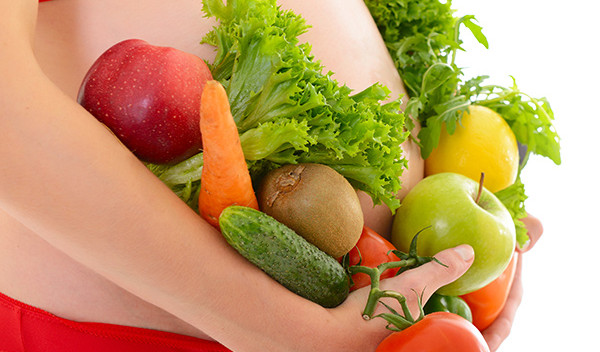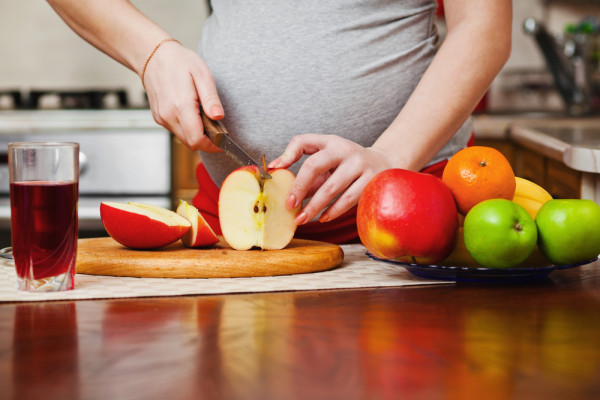Proper nutrition during pregnancy
It is important for a pregnant woman to eat right. After all, the baby should receive all the necessary vitamins and minerals that contribute to the correct development. But this does not mean that you need to constantly chew something. Overeating is just as bad as fasting. The main thing is to pay attention to the quality of the products, not their quantity.
First trimester meals
In the first trimester, a woman should divide her meal 4-5 times at approximately regular intervals. It is advisable not to give up breakfast, but to have dinner a couple of hours before bedtime. This will make it easier to transfer toxicosis... It is recommended to drink about 2 liters of water per day.
In the first months of pregnancy, it is very important to receive the required amount of folic acid or vitamin B9. She participates in the development of organs and tissues of the child, the formation of the nervous system. With a lack of vitamin B9, a woman feels fatigue, nervousness, and decreased appetite. The main source of folic acid is greens. These are green onions, parsley. It is also found in cabbage, spinach, green peas, beets, carrots.
Vitamin B6 helps in the formation of the fetal nervous system. By getting enough of this vitamin, edema can be avoided. B6 is found in meat, fish, cottage cheese, nuts.
Vitamin B12 contributes to the correct growth of the baby and prevents the occurrence of anemia in the expectant mother. To replenish B12, you need to eat food, meat, fish, seafood, as well as eggs and milk.
Vitamin C is essential for maintaining the immune system of a pregnant woman. It also strengthens blood vessels and the placenta. The accumulation of this vitamin in the body does not occur, therefore, products containing vitamin C should be consumed daily. These include citrus fruits, rose hips, black currants, and bell peppers.
Vitamin E counteracts the threat miscarriage... It is found in vegetable oils, liver, nuts.
Vitamin D and calcium have a beneficial effect on the formation of the baby's skeleton. To do this, the diet of the expectant mother should contain butter, sea fish, caviar, dairy products.
Second trimester meals 
In the second trimester, the baby needs even more vitamins. It is developing rapidly. The energy value of a pregnant woman's diet should increase to 2400 kcal. You need to consume more protein. Usually toxicosis by this time passes, which significantly affects the appetite. But worth monitor weight gain.
It is recommended to eat more foods containing calcium and vitamin D. With a lack of these vitamins, the baby's development may slow down. The mother herself may have problems with her teeth, heart rate and muscle pain.
Sweet, fatty and salty foods interfere with the absorption of calcium and vitamin D. Carbonated drinks and cocoa should also be avoided. But dairy products, eggs, green onions, raisins will help replenish the reserves of these vitamins.
Fried should be replaced with boiled and stewed. In between meals, you can eat a vegetable salad or a fruit snack. Rosehip decoction is very useful. It contains a large amount of vitamin C. Juice from apples and celery will help fill the lack of folic acid.
Lack of iron in the body affects the level of hemoglobin and can lead to the development of anemia in a woman. To prevent the development of anemia, you should eat meat, liver, eggs, bell peppers, radishes. Vitamin C helps iron to be absorbed, so citrus fruits and other foods will also be beneficial.
Stool problems may appear in the middle of pregnancy. In this case, foods containing fiber, vegetables and fruits will help.
To avoid the appearance of heartburn, you should abandon the fatty and spicy. Grated carrots, seaweed and mineral water will help fight heartburn.
Third trimester meals 
In the third trimester, the child is already developed and gaining weight. Mom becomes less active, and during this period it is worth reducing calorie intake. It is useful to have a fasting day once a week. On this day, limit yourself to kefir, apples and low-fat cottage cheese. This will help the body cleanse itself.
Omega-3 fatty acids contribute to the development of the baby's brain. For this it is useful to eat fish... The fish can be steamed or stewed with vegetables.
During the last months of pregnancy, late toxicosis may occur. If this happens, you should completely abandon fatty and salty foods. Sweet, smoked food is also prohibited.
Throughout pregnancy, you should reduce your coffee intake and completely avoid alcohol. It is recommended that you consult your doctor before taking herbal teas. Foods that can cause allergies should also be avoided.
If at the end of pregnancy there is an aversion to certain foods, then they can be replaced with others. For example, a lack of protein in case of meat intolerance is easy to compensate for with soy products. Warm food produces fewer aromas than hot food. Accordingly, the likelihood of nausea and disgust is less likely.
Some women adhere vegetarianism... During pregnancy, this can lead to a lack of vitamins and minerals necessary for the fetus. Therefore, it is recommended for this time to give up vegetarianism and eat more wholesome and healthy food.



